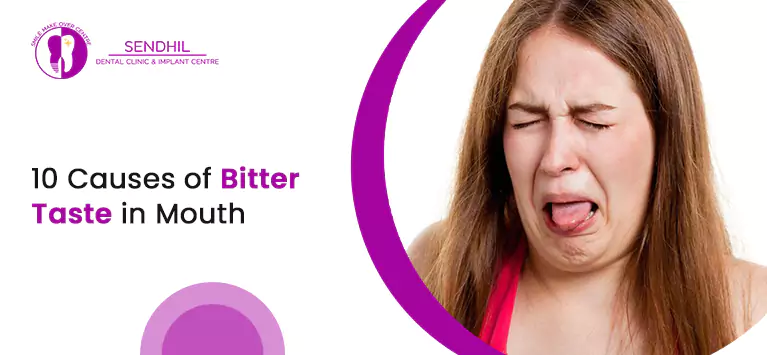
10 Causes of Bitter Taste in Mouth
Have you ever woken up to a bitter taste in your mouth that won’t go away? A bitter taste in the mouth can be more than just an annoyance; it can affect your enjoyment of food, social interactions, and overall well-being. In this blog, let’s explore the ten most common causes of a bitter taste in the mouth.
Causes of Bitter Taste in Mouth
Poor Oral Hygiene

When you skip brushing and flossing, bacteria thrive in your mouth, leading to plaque buildup. This buildup can cause a bitter taste as bacteria break down food particles and release foul-smelling gases. So, maintaining a consistent oral hygiene routine is crucial to keep your mouth fresh and clean.
Medications
Some medications, like antibiotics, antidepressants, and blood pressure drugs, can alter your taste buds’ sensitivity, leaving a bitter or metallic taste in your mouth. This occurs due to the drugs’ chemical composition interacting with your taste receptors. If you suspect your medication is causing this, don’t hesitate to discuss it with your doctor, who may suggest an alternative or adjustment.
Dehydration

Your saliva acts as a natural cleanser for your mouth, washing away food particles and neutralizing acids. When dehydrated, saliva production decreases, allowing bacteria and acids to linger longer, leading to a bitter taste. Drinking plenty of water throughout the day helps maintain saliva production and keeps your mouth hydrated and fresh.
Dietary Factors
Certain foods and drinks, such as acidic fruits, spicy dishes, coffee, and alcohol, can trigger a bitter taste sensation. This happens because these items stimulate excess stomach acid production or leave a residue that alters your mouth’s pH balance. Moderating your consumption of these items can help reduce the likelihood of experiencing a bitter taste.
Gastroesophageal Reflux Disease (GERD)

GERD occurs when stomach acid flows backward into the esophagus, often causing heartburn and a bitter taste in the mouth. This happens due to a malfunctioning sphincter muscle at the bottom of the esophagus. Managing GERD through dietary changes, weight loss, and medication can help alleviate symptoms, including the bitter taste.
Oral Infections
Infections such as gingivitis (gum disease) or oral thrush (a fungal infection) can disrupt the balance of bacteria in your mouth, leading to inflammation and a bitter taste. Proper oral hygiene, including brushing, flossing, and regular dental check-ups, can prevent these infections and maintain a healthy mouth environment.
Smoking

Smoking stains your teeth, contributes to gum disease, and leaves a persistent bitter taste in your mouth. The chemicals in tobacco smoke can linger on your tongue and throat, altering your taste perception. Quitting smoking can improve your overall oral health and eliminate this unpleasant taste.
Sinus Infections
Sinusitis, or inflammation of the sinuses, can cause mucus to accumulate and drip down the back of your throat, resulting in a bitter taste. Treating the underlying sinus infection with decongestants, nasal irrigation, or antibiotics can help alleviate this symptom and restore typical taste sensations.
Pregnancy

Hormonal changes during pregnancy can sometimes lead to a condition called “pregnancy gingivitis,” characterized by swollen, tender gums and a metallic or bitter taste in the mouth. Maintaining good oral hygiene and regular dental visits can help manage these symptoms and ensure optimal oral health during pregnancy.
Stress and Anxiety
Mental health issues like stress and anxiety can affect your body in various ways, including altering your taste perception. Stress hormones can disrupt the balance of saliva production and change the way your brain interprets taste signals, leading to a bitter or metallic taste. Stress-reduction techniques such as mindfulness, exercise, and deep breathing can help alleviate this symptom and promote overall well-being.
Impact of Bitter Taste on Mouth
A bitter taste in the mouth can disrupt social interactions, diminish enjoyment of food, and lead to dietary restrictions, potentially impacting nutrition and overall health. Additionally, it may signal underlying health conditions, causing emotional distress and affecting quality of life. Prompt evaluation and treatment are essential to address symptoms and improve well-being.
To sum up
In summary, a bitter taste in the mouth can disrupt daily life and enjoyment, but understanding its causes offers relief solutions. Poor oral hygiene, medication side effects, and dietary factors can all contribute to this sensation. Additionally, dehydration, GERD, oral infections, and smoking are common causes. Sinus infections, pregnancy-related hormonal changes, and stress and anxiety can also lead to bitterness. If the bitter taste lasts persistently for a long time, visit your dentist. By recognizing these triggers, individuals can take proactive steps to address them, promoting better oral health and overall well-being.



